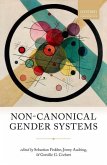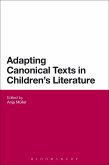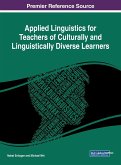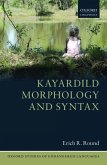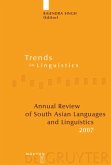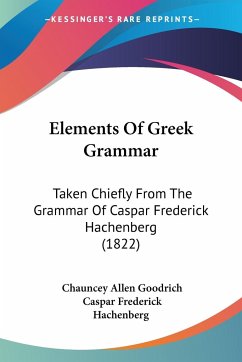Canonical Morphology and Syntax
Herausgeber: Brown, Dunstan; Corbett, Greville G.; Chumakina, Marina
Canonical Morphology and Syntax
Herausgeber: Brown, Dunstan; Corbett, Greville G.; Chumakina, Marina
- Gebundenes Buch
- Merkliste
- Auf die Merkliste
- Bewerten Bewerten
- Teilen
- Produkt teilen
- Produkterinnerung
- Produkterinnerung
This is the first book to present Canonical Typology, a framework for comparing constructions and categories across languages. The canonical method takes the criteria used to define particular categories or phenomena (eg negation, finiteness, possession) to create a multidimensional space in which language-specific instances can be placed.
Andere Kunden interessierten sich auch für
![Non-Canonical Gender Systems Non-Canonical Gender Systems]() Non-Canonical Gender Systems124,99 €
Non-Canonical Gender Systems124,99 €![Adapting Canonical Texts in Children's Literature Adapting Canonical Texts in Children's Literature]() Adapting Canonical Texts in Children's Literature157,99 €
Adapting Canonical Texts in Children's Literature157,99 €![The Grammar of Chinese Characters The Grammar of Chinese Characters]() James MyersThe Grammar of Chinese Characters168,99 €
James MyersThe Grammar of Chinese Characters168,99 €![Applied Linguistics for Teachers of Culturally and Linguistically Diverse Learners Applied Linguistics for Teachers of Culturally and Linguistically Diverse Learners]() Applied Linguistics for Teachers of Culturally and Linguistically Diverse Learners180,99 €
Applied Linguistics for Teachers of Culturally and Linguistically Diverse Learners180,99 €![Kayardild Morphology and Syntax Kayardild Morphology and Syntax]() Erich R. RoundKayardild Morphology and Syntax168,99 €
Erich R. RoundKayardild Morphology and Syntax168,99 €![Annual Review of South Asian Languages and Linguistics Annual Review of South Asian Languages and Linguistics]() Rajendra Singh (Hrsg.)Annual Review of South Asian Languages and Linguistics145,99 €
Rajendra Singh (Hrsg.)Annual Review of South Asian Languages and Linguistics145,99 €![Elements Of Greek Grammar Elements Of Greek Grammar]() Chauncey Allen GoodrichElements Of Greek Grammar27,99 €
Chauncey Allen GoodrichElements Of Greek Grammar27,99 €-
-
-
This is the first book to present Canonical Typology, a framework for comparing constructions and categories across languages. The canonical method takes the criteria used to define particular categories or phenomena (eg negation, finiteness, possession) to create a multidimensional space in which language-specific instances can be placed.
Produktdetails
- Produktdetails
- Verlag: OUP UK
- Seitenzahl: 328
- Erscheinungstermin: 1. März 2013
- Englisch
- Abmessung: 240mm x 161mm x 22mm
- Gewicht: 658g
- ISBN-13: 9780199604326
- ISBN-10: 0199604320
- Artikelnr.: 35482627
- Herstellerkennzeichnung
- Libri GmbH
- Europaallee 1
- 36244 Bad Hersfeld
- gpsr@libri.de
- Verlag: OUP UK
- Seitenzahl: 328
- Erscheinungstermin: 1. März 2013
- Englisch
- Abmessung: 240mm x 161mm x 22mm
- Gewicht: 658g
- ISBN-13: 9780199604326
- ISBN-10: 0199604320
- Artikelnr.: 35482627
- Herstellerkennzeichnung
- Libri GmbH
- Europaallee 1
- 36244 Bad Hersfeld
- gpsr@libri.de
Dunstan Brown is a member of the Surrey Morphology Group, University of Surrey and, Professor at the University of York. His research interests include autonomous morphology, morphology-syntax interaction and typology. His recent work has focused on describing and understanding different aspects of morphological complexity, notably The Syntax-Morphology Interface: A Study of Syncretism (with Matthew Baerman and Greville G. Corbett, CUP 2005) and Network Morphology (with Andrew Hippisley, CUP 2012). Marina Chumakina is a Research Fellow in the Surrey Morphology Group, University of Surrey. Her work focuses on Nakh-Daghestanian languages and typology. She has done extensive fieldwork on Archi language resulting in an electronic Archi Dictionary (together with Dunstan Brown, Greville G. Corbett and Harley Quilliam). Greville G. Corbett is Distinguished Professor of Linguistics, University of Surrey, and leads the Surrey Morphology Group. He works on the typology of features, as in Gender (1991), Number (2000) and Agreement (2006) and Features (forthcoming), all with Cambridge UP. Recently he has been developing the canonical approach to typology. He is one of the originators of Network Morphology; see The Syntax-Morphology Interface: A Study of Syncretism (with Matthew Baerman and Dunstan Brown, CUP 2005).
* 1: Dunstan Brown and Marina Chumakina: What there might be and what
there is: an introduction to Canonical Typology
* 2: Oliver Bond: A base for canonical negation
* 3: Greville G. Corbett: Canonical morphosyntactic features
* 4: Nicholas Evans: Some problems in the typology of quotation: a
canonical approach
* 5: Irina Nikolaeva: Unpacking finiteness
* 6: Andrew Spencer and Ana LuÃs: The canonical clitic
* 7: Anna Siewierska and Dik Bakker: Passive agents: prototypical vs.
canonical passives
* 8: Martin Everaert: The criteria for reflexivization
* 9: Irina Nikolaeva and Andrew Spencer: Possession and modification -
a perspective from Canonical Typology
* 10: Scott Farrar: An ontological approach to Canonical Typology:
laying the foundations for e-linguistics
* References
* Author Index
* Language Index
* Subject Index
there is: an introduction to Canonical Typology
* 2: Oliver Bond: A base for canonical negation
* 3: Greville G. Corbett: Canonical morphosyntactic features
* 4: Nicholas Evans: Some problems in the typology of quotation: a
canonical approach
* 5: Irina Nikolaeva: Unpacking finiteness
* 6: Andrew Spencer and Ana LuÃs: The canonical clitic
* 7: Anna Siewierska and Dik Bakker: Passive agents: prototypical vs.
canonical passives
* 8: Martin Everaert: The criteria for reflexivization
* 9: Irina Nikolaeva and Andrew Spencer: Possession and modification -
a perspective from Canonical Typology
* 10: Scott Farrar: An ontological approach to Canonical Typology:
laying the foundations for e-linguistics
* References
* Author Index
* Language Index
* Subject Index
* 1: Dunstan Brown and Marina Chumakina: What there might be and what
there is: an introduction to Canonical Typology
* 2: Oliver Bond: A base for canonical negation
* 3: Greville G. Corbett: Canonical morphosyntactic features
* 4: Nicholas Evans: Some problems in the typology of quotation: a
canonical approach
* 5: Irina Nikolaeva: Unpacking finiteness
* 6: Andrew Spencer and Ana LuÃs: The canonical clitic
* 7: Anna Siewierska and Dik Bakker: Passive agents: prototypical vs.
canonical passives
* 8: Martin Everaert: The criteria for reflexivization
* 9: Irina Nikolaeva and Andrew Spencer: Possession and modification -
a perspective from Canonical Typology
* 10: Scott Farrar: An ontological approach to Canonical Typology:
laying the foundations for e-linguistics
* References
* Author Index
* Language Index
* Subject Index
there is: an introduction to Canonical Typology
* 2: Oliver Bond: A base for canonical negation
* 3: Greville G. Corbett: Canonical morphosyntactic features
* 4: Nicholas Evans: Some problems in the typology of quotation: a
canonical approach
* 5: Irina Nikolaeva: Unpacking finiteness
* 6: Andrew Spencer and Ana LuÃs: The canonical clitic
* 7: Anna Siewierska and Dik Bakker: Passive agents: prototypical vs.
canonical passives
* 8: Martin Everaert: The criteria for reflexivization
* 9: Irina Nikolaeva and Andrew Spencer: Possession and modification -
a perspective from Canonical Typology
* 10: Scott Farrar: An ontological approach to Canonical Typology:
laying the foundations for e-linguistics
* References
* Author Index
* Language Index
* Subject Index



